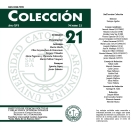Por favor, use este identificador para citar o enlazar este ítem:
https://repositorio.uca.edu.ar/handle/123456789/7084| Título: | Walter Benjamin y Hannah Arendt : la noción de tiempo histórico y la tarea del historiador | Autor: | Goyenechea, Elisa | Palabras clave: | Benjamin, Walter, 1892-1940; Arendt, Hannah, 1906-1975; HISTORIA; HISTORIADORES; HISTORIOGRAFIA | Fecha de publicación: | 2011 | Editorial: | Pontificia Universidad Católica Argentina. Facultad de Ciencias Sociales, Políticas y de la Comunicación. Instituto de Ciencias Políticas y Relaciones Internacionales | Cita: | Goyenechea de Benvenuto, E. Walter Benjamin y Hannah Arendt : la noción de tiempo histórico y la tarea del historiador [en línea]. Colección. 2011, 21. Disponible en: https://repositorio.uca.edu.ar/handle/123456789/7084 | Resumen: | Resumen: Este trabajo pretende poner en evidencia la apropiación selectiva que Hannah Arendt hizo del pensamiento de Benjamin en relación con el tema del tiempo histórico y el oficio del historiador. En cuanto a la primera cuestión, la tradición de los oprimidos, defendida por Benjamin e instauradora de una mirada novedosa de los sucesos históricos, es un tópico presente en la glorificación arendtiana de la tradición revolucionaria perdida. En segundo término, el deslizamiento de la épica hacia la historiografía, y de esta, a su vez, hacia la crónica, manifestado en “The Storyteller. Reflections on the Work of Nikolai Leskov”, resuena en el enfoque que Hannah Arendt asume para emprender su crítica al concepto moderno de Historia como un proceso omniabarcante en cuyo seno los eventos adquieren significación a expensas de su unicidad. La índole peculiar de la categoría de la acción, esbozada en The Human Condition, es la clave para entender la noción de la historia abierta a sucesivas reapropiaciones y relecturas, precisamente porque se trata de una verdad ínsita en un mundo humano. Abstract: The aim of this work is to show Hannah Arendt’s selective appropriation of Walter Benjamin’s thoughts concerning historical time and the task of the historian. As regards the former, the tradition of the oppressed, supported by Benjamin, establishes a renewed view of historical events. This thesis can be found in Arendt’s glorification of the lost revolutionary tradition. As regards the latter, the epic shifts to historiography and this one to chronicle, as shown in “The Storyteller. Reflections on the Work of Nikolai Leskov”. This shift can be seen in Hannah Arendt’s critical approach to the modern concept of History, as an embracing process within which events become meaningful at the expense of its uniqueness. The peculiar nature of the category of action, outlined in The Human Condition, is the key to understand the notion of history, opened to successive re-appropriations and re-interpretations, precisely because it is a truth implanted in a human world. |
URI: | https://repositorio.uca.edu.ar/handle/123456789/7084 | ISSN: | 0328-7998 (impreso) 1850-003X (online) |
Disciplina: | CIENCIA POLITICA | Derechos: | Acceso Abierto | Fuente: | Colección. 2011, 21 |
| Aparece en las colecciones: | COL - 2011 Año XVI nro. 21 |
Ficheros en este ítem:
| Fichero | Descripción | Tamaño | Formato | |
|---|---|---|---|---|
| benjamin-arendt-nocion-tiempo-historico.pdf | 270,29 kB | Adobe PDF |  Visualizar/Abrir |
Visualizaciones de página(s)
784
comprobado en 27-abr-2024
Descarga(s)
233
comprobado en 27-abr-2024
Google ScholarTM
Ver en Google Scholar
Este ítem está sujeto a una Licencia Creative Commons

